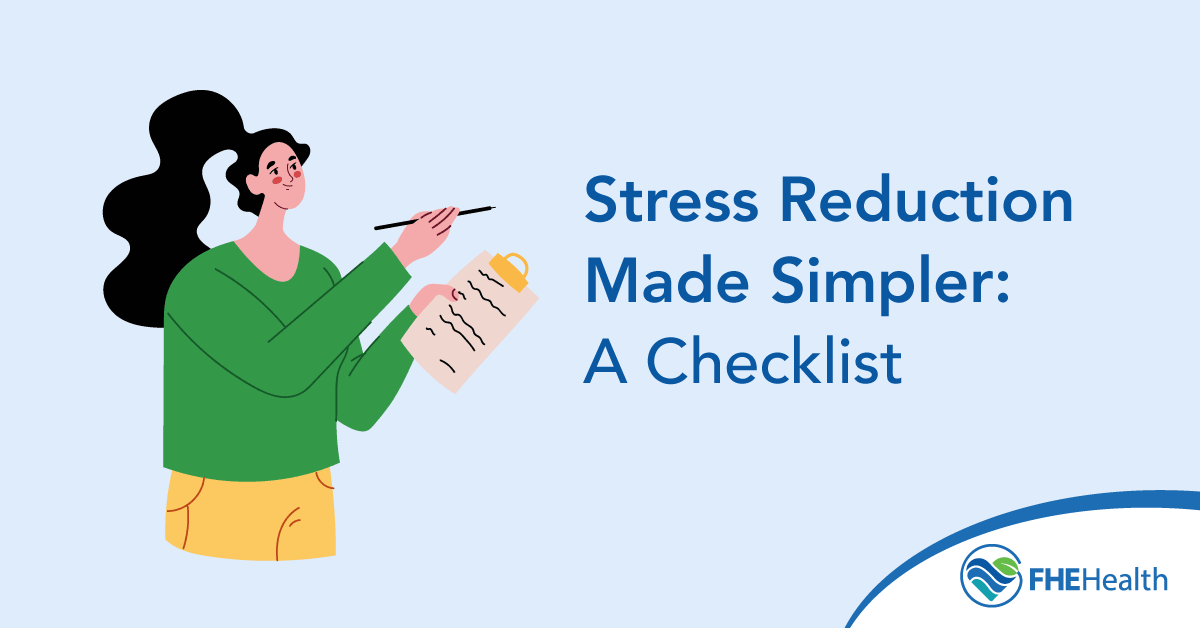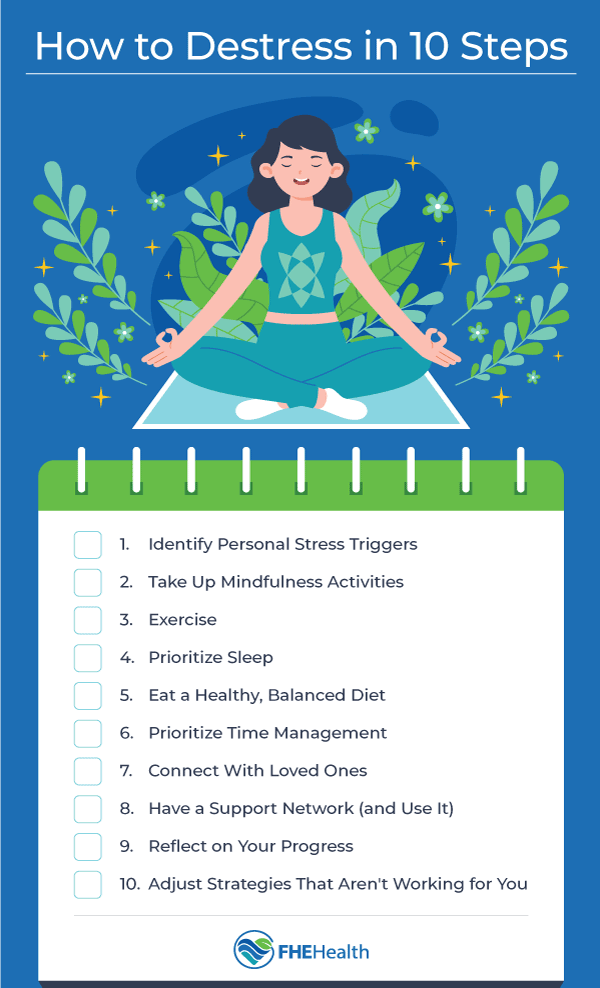
Everyone gets stressed out sometimes. It’s an unavoidable part of life. But prolonged periods of stress are unhealthy for your physical, mental and emotional well-being. Luckily, stress isn’t permanent, and there are actions you can take to lower and control your stress levels.
Wondering how to destress? You’ve come to the right place; keep reading for 10 easy, practical suggestions on how to get rid of stress.
Understanding Stress and Its Impact
Minor levels of stress are manageable and even good for you. A bit of stress can help you meet a looming deadline or tackle that task you’ve been avoiding.
But long-term stress comes with many health risks. For your mental health, prolonged stress can increase the risk of:
- Anxiety
- Depression
- Substance abuse
- Sleep issues
Additionally, high stress levels can cause physical and medical problems, including:
- Headaches
- Gastrointestinal problems
- Weakened immune system
- Fertility issues
- High blood pressure
- Muscle tension
- Cardiovascular disease
- Stroke
How to Destress in 10 Steps
Wondering how to relieve stress quickly? Here’s our 10-step stress reduction checklist:
1. Identify Personal Stress Triggers
Everyone has personal stress triggers in their life that set them off. These stress triggers are typically based on past personal experiences and traumas. For example, someone with a lot of family relationship issues may find themselves incredibly stressed out anytime they argue with a relative.
It’s essential to recognize your stress triggers so you can manage them. Do your best to avoid them if possible. When you realize you’re in a situation that’s triggering your stress, do what you can to remove yourself from it.
2. Take Up Mindfulness Activities
Mindfulness activities help you calm your mind and achieve a place of serenity. When you feel you’re getting overly stressed, it’s crucial to have a method for stress relief that’s easy and accessible.
Yoga, meditation, journaling and walking outdoors are some common mindfulness activities that can help you instantly destress.
3. Exercise
Exercise isn’t just good for the body; it’s good for the mind, too. When you exercise, your body releases endorphins, which are natural mood elevators for your brain. You can typically expect to feel relaxed and more optimistic after a hard workout — and have a sense of accomplishment.
It doesn’t always have to be an intense workout to get that endorphin boost, either. While some may destress with a run or a weightlifting session at the gym, don’t forget that going for a long walk or a casual bike ride can achieve the same thing.
4. Prioritize Sleep
Stress and sleep are very closely intertwined. When you feel stressed, your thoughts tend to race and your adrenaline pumps, making falling asleep difficult. But the less you sleep, the more stressed you get because you’re overtired and unable to think clearly.
One sleep survey found that 63% of people who report not sleeping enough also frequently experience stress.
If you notice you’re stressed, you need to prioritize getting a quality night’s rest. Some of the ways you can improve your sleep are:
- Getting blackout curtains
- Getting a sound machine
- Stopping the use of all electronics at least 1 hour before bed
- Practicing a mindfulness activity before bed
- Going to bed at the same time
5. Eat a Healthy, Balanced Diet
When you’re stressed, it’s natural to want to grab some junk food to make yourself feel momentarily better. But this might have the opposite effect and add to your stress levels.
Your diet is closely linked to your overall mental well-being. When you eat poorly, you can feel sluggish. And if you start to gain weight, this can add a new worry to your pile of things to stress over.
Eating a well-balanced diet of healthy, whole foods helps you have the energy to feel good throughout the day.
6. Prioritize Time Management
It’s no surprise to anyone that increased stress often comes from poor time management. When you feel like you have a million tasks in front of you, it can become debilitating and overwhelming to know where to start.
Learning time management can help you divide and conquer your daily priorities, making every day feel more manageable. Plan out your day, create lists and keep an updated schedule so you feel like you have some control over the tasks in your day.
7. Connect With Loved Ones
Spending quality time with loved ones is one of the best destressors available. When you’re stressed and busy, it can be easy to get wrapped up in the daily grind and forget about those who matter most.
Make it a priority to connect with a loved one at least once daily. This can look like sitting down for dinner with your partner with zero distractions or phoning a friend on your drive home from work. These moments can allow you to unload worries, talk through problems and be reminded of the love you have all around you.
8. Have a Support Network (and Use It)
Some stressors come from big problems that aren’t going to just disappear this week or next. For example, someone with a substance abuse addiction or mental health problems might find themselves more stressed out at times when their condition feels unmanageable or overwhelming.
Make sure you have a support network to help guide you through these difficult times. Identify who that support network is, and use it when you need to. A support network can look like friends and family, support groups or even a therapist.
9. Reflect on Your Progress
As you work toward making positive changes to destress, stop and reflect on your progress. Your stress will never go entirely away, but that doesn’t mean you haven’t made meaningful progress to reduce your stress levels overall.
10. Adjust Strategies That Aren’t Working for You
As you work through these destressing tips, you can identify which feel like they fit into your lifestyle and which simply don’t. Stick to the destressing techniques that feel easy and make a noticeable difference in your life.
Get Help Tackling Life’s Challenges With FHE Health
Sometimes, increasing stress is a symptom of a bigger problem, such as a mental health condition. If you’re struggling and need someone to talk to, consider professional support. Our counselors are here for you and can help you work through your challenges. Contact us today to get started.







